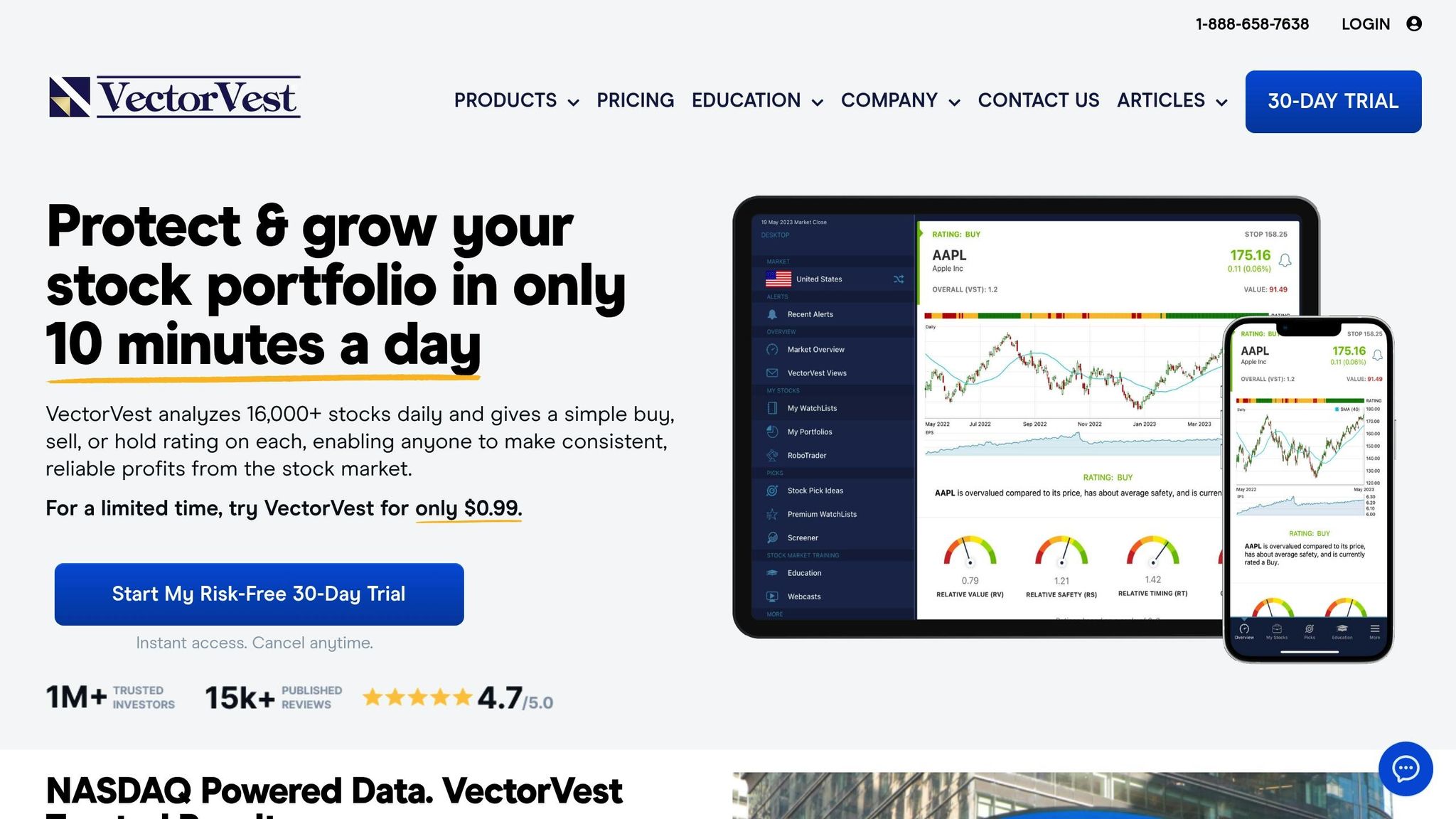Quantum computing investments skyrocketed in 2025, reflecting the industry's rapid growth and increasing maturity. Here's a quick snapshot:
- Investment Surge: Funding jumped from $550M in Q1 2024 to $1.25B in Q1 2025 - a 128% increase.
- Market Growth: Revenue for quantum startups is projected to surpass $1B in 2025, up from $700M in 2024.
- Government Support: Japan pledged $7.4B, Spain committed $900M, and the U.S. maintains leadership with over $3B in funding.
- Major Funding Rounds: Companies like IonQ, QuEra, and Rigetti secured hundreds of millions in Q1 and Q2 2025.
- Future Outlook: The quantum computing market could grow from $4B in 2024 to $72B by 2035.
The focus has shifted from hardware to software, with sectors like finance, pharmaceuticals, and cybersecurity driving demand. This year marks a turning point as quantum computing transitions from experimental to commercially viable solutions.
Quantum Computing Stocks are Soaring into 2025! | VectorVest

Investment Trends and Market Growth
The investment landscape has evolved significantly, transitioning from experimental phases to a focus on commercial applications. This shift has drawn substantial funding from both private investors and government initiatives, setting the stage for the detailed statistics and trends discussed below.
Key Funding Statistics for 2025
In 2025, venture capital poured approximately $2.0 billion into quantum startups [4]. The global quantum technology market reached $1.88 billion, marking a 27.3% jump from $1.48 billion in 2024 [4]. Projections suggest this growth will persist, with the market expected to hit $4.89 billion by 2029 [4]. Long-term forecasts are even more ambitious, predicting the global quantum computing market could grow to $16.22 billion by 2034, with an annual growth rate of 30.88% [8].
Quantum computing companies dominate the funding landscape, accounting for 61.7% of all quantum technology investments [4]. These companies, which generated between $650 million and $750 million in 2024, are projected to surpass $1.0 billion in revenue by 2025 [1]. Commercial orders for quantum computers also surged, reaching $854 million in 2024 - a 70% increase from 2023 [5].
The funding structure has shifted as well. Private sector funding, primarily from venture capital and private equity, totaled $1.3 billion in 2024, representing about two-thirds of total investments. However, this marked a 19-percentage-point drop compared to 2023 [1]. To offset this decline, governments stepped in, collectively investing $680 million directly into quantum startups in 2024 as part of a broader $1.8 billion commitment to quantum initiatives [1].
Top Growth Drivers
Several key factors are fueling this rapid growth in quantum technology investments:
- Enterprise Adoption: Companies are increasingly viewing quantum computing as a strategic investment with a five-year horizon, driven by early successes in areas like simulation, optimization, and secure communications [3].
- Technological Progress: The focus has shifted from simply increasing quantum bits (qubits) to stabilizing them, a critical step toward making quantum systems reliable for large-scale use. Advances in error correction are playing a crucial role in achieving the stability needed for real-world applications [1].
- Geopolitical Competition: Quantum computing has become a cornerstone of national competitiveness. Countries like the United States, China, and regions in Europe are racing to lead the field. Notable government investments include Australia's $620 million initiative, Illinois' $500 million commitment, and Singapore's $222 million funding package [1].
- Public-Private Partnerships: These collaborations are accelerating market growth by funding large-scale infrastructure projects. Governments are increasingly backing quantum technology, while multi-year contracts and full-stack system sales signal a maturing industry [5].
Investor confidence in quantum startups is growing, as evidenced by fewer but larger funding rounds that reflect a more strategic approach to investment [5]. The belief that quantum technology will deliver measurable value is gaining traction. Siddhant Masson, CEO of Wokelo AI, highlighted this optimism:
"So we're seeing the road to commercial quantum computing is being paved steadily, and the funding is there to support the journey." [7]
With these drivers in play, 2025 is shaping up to be a transformative year for quantum computing, marking its shift from a niche research area to a commercially viable industry. The trends outlined here underscore the growing momentum and global interest in this groundbreaking field.
Major Players and Funding Rounds
The quantum computing sector experienced a surge in funding activity in 2025, with several companies securing major investments that reshaped the competitive landscape. These developments highlight growing investor confidence in quantum technologies and a clear focus on companies with demonstrated commercial potential.
Large Funding Rounds
In the first quarter of 2025, investments in quantum technology reached over $1.25 billion, marking a 125% increase compared to Q1 2024 [9]. This significant growth reflects a shift toward funding companies that are closer to delivering products and generating revenue.
IonQ stood out by raising $360 million through an equity offering in Q1 2025 [6]. The company also made two key acquisitions early in the year: Oxford Ionics for $1.075 billion and ID Quantique for $250 million [6] [11] [10]. These moves aim to expand IonQ’s capabilities in trapped-ion quantum systems, quantum networking, and sensing technologies.
QuEra Computing achieved the largest single funding round of Q1 2025, securing $230 million in Series B funding [6]. This round reflects growing confidence in neutral atom architectures as a competitive alternative to traditional superconducting platforms.
Quantum Machines raised $170 million in a Series C round [6], with its orchestration hardware and software gaining attention for enabling compatibility across different quantum architectures.
D-Wave Systems completed a $150 million equity offering during Q1 2025 [6], reinforcing its role in hybrid quantum–classical computing, particularly for optimization problems.
The momentum carried into Q2 2025. Rigetti Computing raised $350 million through an at-the-market stock offering [6]. The company plans to deliver a 36-qubit system by mid-2025, aiming to surpass 100 qubits by year-end, with a long-term goal of developing a 336-qubit Lyra system [2].
Multiverse Computing secured €189 million (around $215 million) in Q2 2025 [6], and Infleqtion Inc. raised $100 million during the same period [6]. These investments highlight strong interest in quantum software and applications, alongside continued support for hardware advancements.
European companies also made notable strides. French firm Alice & Bob raised €100 million (approximately $107 million) in Q1 2025 [3], gaining recognition for its work on fault-tolerant cat qubits within the superconducting quantum computing domain.
These major funding rounds signal a trend toward strategic consolidation and long-term growth in the quantum industry.
Market Consolidation Trends
In addition to large funding rounds, strategic acquisitions played a key role in shaping the industry. In January 2025, IonQ acquired Qubitekk for $22 million, gaining access to 118 quantum network patents [11] [13]. Qubitekk’s expertise in photonic interconnects is expected to advance quantum clusters, secure communications, and distributed quantum computing.
More than half of quantum computing companies now rely on platforms developed by leading hardware and control firms [10]. The industry is increasingly shifting toward integrated solutions, with companies offering comprehensive systems rather than individual components.
Multi-year contracts and full-stack system sales have become the norm, reflecting a move from experimental projects to commercial-scale deployments [5]. The focus has shifted to delivering practical solutions that address concrete business challenges.
Google CEO Sundar Pichai compared the current state of quantum computing to the early days of AI:
"The quantum moment reminds me of where AI was in the 2010s, when we were working on Google Brain and the early progress." [12]
This analogy emphasizes the transition of quantum computing from a research-driven field to a commercially viable industry. The funding rounds and strategic moves of 2025 have set the stage for transformative growth in the years to come.
sbb-itb-1ae7b2a
Regional Investment Patterns
The surge in large funding rounds has highlighted regional strategies that showcase the global drive to advance quantum computing. Investment trends vary across regions, shaped by unique government policies, industrial strengths, and competitive goals. These differences paint a vivid picture of how each major market is approaching the quantum race.
North America: A Powerhouse of Quantum Innovation
The United States stands as the undisputed leader in quantum computing, home to over 50% of the world’s quantum startups [14]. This dominance stems from decades of strategic investments and a thriving ecosystem supported by government funding, venture capital, and corporate research.
Through the National Quantum Initiative, the U.S. government has committed more than $3 billion to quantum research, while venture capital continues to funnel substantial private funding into the sector [14]. New hubs of innovation are also emerging, with Maryland gaining recognition as a growing quantum cluster [1]. This well-established ecosystem in North America sets it apart from the rapidly evolving landscapes in Asia-Pacific and Europe.
Asia-Pacific and Europe: Rising Contenders
Although North America leads in total investment, Asia-Pacific is on track to experience the fastest growth in quantum funding [14]. This momentum is fueled by significant government initiatives and strategic national priorities. China, for instance, has allocated over $15 billion to quantum research, reinforcing its ambition to dominate the field. The country also holds a strong position in quantum computing patents, further solidifying its leadership aspirations [1]. Japan has also made a bold move, dedicating $7.4 billion to its quantum sector [1].
Key hubs are emerging across Asia-Pacific. Tokyo is becoming a focal point for quantum development [1], while Singapore recently announced a $222 million investment in quantum research and talent, with plans unveiled in May 2024 [1].
Europe, meanwhile, is carving out its place through coordinated regional efforts. The European Union’s €1 billion Quantum Flagship program is designed to keep the region competitive with powerhouses like the U.S. and China [14]. Individual nations are also stepping up: the U.K. has pledged £1 billion toward quantum R&D, and Spain has committed $900 million [14][1].
These regional strategies highlight the global competition in quantum technology, where national competitiveness is increasingly at stake [3]. Each region is leveraging its strengths to stay ahead: North America’s venture capital ecosystem, Asia’s ambitious government funding, and Europe’s collaborative research programs all play a role in shaping the future of quantum computing.
Georges-Olivier Reymond, Co-founder of the French quantum company Pasqal, captured this international dynamic:
"Pasqal is dedicated to industrialization and international development – our team is transforming fundamental quantum research into cutting-edge industrial applications. We are expanding our manufacturing facilities worldwide and opening new offices in Saudi Arabia, South Korea, and other locations to come. Our goal is to meet the growing market demand for quantum computers and have a significant impact on the quantum computing industry." [2]
The Future of Quantum Computing Investments
The world of quantum computing investments is evolving, with the focus shifting from pure research to practical, commercial applications. As 2025 approaches its end, the sector is showing signs of maturity, with investors prioritizing projects that promise real-world impact and revenue generation over mere scientific breakthroughs.
Key Highlights of 2025
This year has been a game-changer for quantum computing investments. Funding rose dramatically, climbing from $1.3 billion in 2023 to nearly $2.0 billion in 2024[1]. This surge reflects growing confidence in the sector's ability to deliver tangible value.
The way investments are distributed is also changing. Instead of spreading funds across numerous early-stage startups, investors are now channeling their resources into fewer but larger funding rounds, signaling a more focused approach to building scalable quantum solutions[5].
Revenue growth in the quantum sector has been equally noteworthy. In 2024, quantum companies generated between $650 million and $750 million in revenue, and projections suggest they'll surpass $1 billion in 2025[1]. Government backing has also ramped up, with $1.8 billion in public funding announced for quantum technology initiatives in 2024[1].
A notable trend in 2025 is the transition from hardware-centric development to a stronger emphasis on software. While hardware remains essential, there's growing recognition that software solutions and quantum algorithms will drive the next wave of applications. This shift mirrors earlier changes in investment strategies, as stakeholders look for quicker paths to commercial viability.
The rise of the Quantum Computing as a Service (QCaaS) model is another significant development. By making quantum tools more accessible, QCaaS is expanding the customer base and creating new opportunities for businesses to integrate quantum capabilities into their operations[16]. These advancements are paving the way for an exciting future in quantum computing investment.
Outlook for 2026 and Beyond
Building on the momentum of 2025, the quantum computing market is poised for remarkable growth in the coming years. McKinsey predicts the market could hit $100 billion within a decade, driven by accelerating investments and rapid advancements[1]. Even conservative estimates suggest the sector will grow from $4 billion in revenue in 2024 to as much as $72 billion by 2035[1].
Several factors are expected to fuel this growth. One major trend is hybrid quantum-classical computing, which combines the strengths of both systems to tackle complex challenges more effectively[16]. This approach makes quantum computing more practical for real-world scenarios, while classical systems handle routine computations.
Artificial intelligence (AI) is another powerful driver. Hyperion Research estimates that by 2026, 18% of quantum algorithm revenue will come from AI applications[15].
"We expect the first significant breakthroughs in Quantum AI to emerge by the end of this decade and the beginning of the next, as we transition from today's noisy quantum devices to error-corrected quantum computers with tens to hundreds of logical qubits. These machines will allow us to move beyond purely experimental NISQ quantum algorithms, unlocking practical and potentially unexpected advantages for AI applications." - Dr. Ines de Vega, Head of Quantum Innovation, IQM [15]
Investors are also drawn to industry-specific applications of quantum computing. Sectors like chemicals, life sciences, finance, and mobility stand out as key areas of growth, given their reliance on solving complex optimization and simulation problems[1]. These industries are likely to benefit significantly from quantum advancements, further driving market consolidation and revenue expansion.
Quantum communication is another emerging opportunity. This market, valued at $1.2 billion in 2024, is projected to grow to between $10.5 billion and $14.9 billion by 2035[1]. With cybersecurity becoming a top priority, quantum-secured communication is increasingly seen as indispensable for governments and enterprises.
Investors are now focusing on companies that demonstrate stability and compatibility with existing IT systems[3]. The era of funding purely experimental ventures is giving way to supporting businesses with clear paths to commercial deployment.
The global quantum technology market is forecasted to reach $1.88 billion in 2025, a 27.3% jump from $1.48 billion in 2024. By 2029, it could grow to $4.89 billion[4]. With its increasing commercial potential, quantum computing is shaping up to be one of the most promising investment areas of the next decade.
For more strategic insights, visit Best Business Books (https://businessbooklist.com).
FAQs
What is driving the surge in quantum computing investments in 2025?
The year 2025 is shaping up to be a pivotal moment for quantum computing, with investments skyrocketing due to several driving forces. Venture capital funding has surged to an estimated $2 billion, signaling growing trust in the transformative potential of this technology across various industries. Adding to the momentum, the United Nations has designated 2025 as the International Year of Quantum Science and Technology, sparking global interest and fostering collaboration on an unprecedented scale.
On the technical front, advancements in quantum hardware - like processors surpassing 100 qubits - and the emergence of specialized software have pushed innovation into high gear. These developments have caught the attention of businesses and governments, eager to explore quantum computing's possibilities in areas such as cryptography, logistics, and drug discovery.
How are countries investing in quantum computing, and what does this mean for global competition?
In 2025, nations across the globe are pouring resources into quantum computing, sparking innovation and intensifying global competition. The United States is leading the effort, with major players like IBM, Google, and Microsoft driving advancements. This year alone, venture capital investments in the U.S. have surpassed $2 billion, showcasing the high stakes in this emerging field. Meanwhile, Europe is pushing forward with initiatives like the Quantum Flagship program, and China is rapidly advancing its quantum strategy, cementing its role as a major contender.
This global pursuit of quantum dominance goes beyond technology - it’s reshaping economic and geopolitical strategies. As countries vie for leadership in this groundbreaking field, we’re likely to see swift advancements and shifts in global power dynamics in the years ahead.
Why is the quantum computing industry shifting its focus from hardware to software and Quantum Computing as a Service (QCaaS)?
The quantum computing industry is shifting gears, moving from a hardware-first approach to prioritizing software and Quantum Computing as a Service (QCaaS). This change is making quantum technology more practical and accessible. Instead of grappling with the high costs and complexities of building quantum hardware, businesses and researchers can now tap into quantum computing power via cloud-based platforms - eliminating the need for expensive on-site infrastructure.
This transition is bolstered by advancements in software that enhance the functionality of noisy intermediate-scale quantum (NISQ) devices. These software improvements are opening doors to practical applications in fields like optimization, cryptography, and machine learning. By reducing barriers to entry, this evolution is helping quantum computing reach a broader audience and driving its adoption in real-world scenarios.


